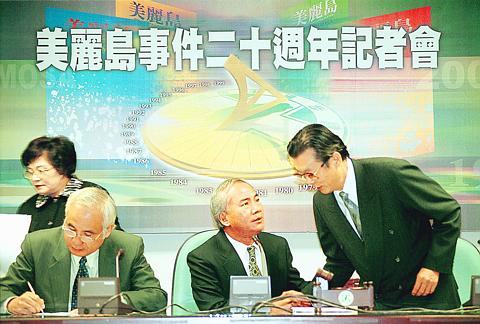While commemorating the 20th anniversary of the Kaohsiung Incident, now recognized as a seminal episode in Taiwan's democratic development, DPP leaders yesterday demanded the government redress the wrongs of those convicted in its aftermath and restore the "historical truth" of the Incident.
DPP legislator Chang Chun-hsiung (張俊雄) -- then a defense lawyer for the opposition politicians charged with sedition over the Incident -- said the government should take action through the legal system, rather than paying mere lip service to the event.
"When [former DPP chairman] Huang Hsin-chieh (黃信介) passed away, President Lee Teng-hui (李登輝) and Vice President Lien Chan (連戰) unanimously praised him for his contribution to Taiwan's democracy. And when some politicians yesterday revisited the prison where they had once been jailed, they were received as honored guests because of their contributions to peaceful reform," Chang said.

PHOTO: GEORGE TSORNG, TAIPEI TIMES
"Nevertheless, in the eyes of the law, these politicians are still convicted seditionists," Chang added.
Huang was sentenced and jailed for sedition over his part in the Incident, along with a group of other opposition activists who later also became key players in the DPP.
The Incident is considered to have ultimately prompted the KMT government to lift a ban on the formation of political parties in the 1980s, which made possible the founding of the DPP.
Chang said it is essential that lessons from the Incident are passed down to the next generation.
"We wish to establish the historical truth to avoid a repetition of such wrongs in the next generation," Chang said.
Chang said some mystery still surrounds the Incident, such as whether it was a trap set by the KMT in its battle against the opposition elite, or whether it was connected with the murder of the mother and two daughters of current DPP Chairman Lin I-hsiung (
"We wonder if these were actions ordered by the KMT to warn people against supporting the opposition movement," Chang said.
Chen Chi-mai (
"The main purpose of the law is to ensure the transparency of government information to facilitate public supervision and to restore the original look of historical incidents," Chen said.
Despite the past injustices and these many mysteries, Lin said the DPP is proud to say that Taiwan is a country today owing to its democratic development over the past two decades.
"Though our democratic system still isn't very stable, though social confrontation and contradictions left over by history remain, and though the justice, harmony and peace that we expected have not reached a perfect state, we now enjoy the right and ability to realize our dreams," Lin said in an official statement issued on behalf of the DPP.
Lin said the DPP hopes to push Taiwan's democracy to maturity through the transfer of power.
Responding to the DPP's demand for redress, high-ranking officials from the Executive Yuan said the government needs some time to study the matter.
The officials added that judicial investigation into the murder of Lin's family and Chen's murder will continue.

ACTION PLAN: Taiwan would expand procurement from the US and encourage more companies to invest in the US to deepen bilateral cooperation, Lai said The government would not impose reciprocal tariffs in retaliation against US levies, President William Lai (賴清德) said yesterday, as he announced five strategies to address the issue, including pledging to increase Taiwanese companies’ investments in the US. Lai has in the past few days met with administrative and national security officials, as well as representatives from various industries, to explore countermeasures after US President Donald Trump on Wednesday last week announced a 32 percent duty on Taiwanese imports. In a video released yesterday evening, Lai said that Taiwan would not retaliate against the US with higher tariffs and Taiwanese companies’ commitments to

‘SPECIAL CHANNEL’: Taipei’s most important tasks are to stabilize industries affected by Trump’s trade tariffs and keep negotiations with Washington open, a source said National Security Council Secretary-General Joseph Wu (吳釗燮) arrived in the US for talks with US President Donald Trump’s administration, a source familiar with the matter said on Friday. Wu was leading a delegation for a meeting known as the “special channel,” the Financial Times reported earlier. It marked Trump’s first use of the channel since returning to the White House on Jan. 20. Citing a source familiar with the matter, the Financial Times reported that Minister of Foreign Affairs Lin Chia-lung (林佳龍) was also a part of the delegation. The visit came days after China concluded war games around Taiwan and amid Trump’s

CHIP EXCEPTION: An official said that an exception for Taiwanese semiconductors would have a limited effect, as most are packaged in third nations before being sold The Executive Yuan yesterday decried US President Donald Trump’s 32 percent tariff on Taiwanese goods announced hours earlier as “unfair,” saying it would lodge a representation with Washington. The Cabinet in a statement described the pledged US tariffs, expected to take effect on Wednesday next week, as “deeply unreasonable” and “highly regrettable.” Cabinet spokeswoman Michelle Lee (李慧芝) said that the government would “lodge a solemn representation” with the US Trade Representative and continue negotiating with Washington to “ensure the interests of our nation and industries.” Trump at a news conference in Washington on Wednesday announced a 10 percent baseline tariff on most goods

Intelligence agents have recorded 510,000 instances of “controversial information” being spread online by the Chinese Communist Party (CCP) so far this year, the National Security Bureau (NSB) said in a report yesterday, as it warned of artificial intelligence (AI) being employed to generate destabilizing misinformation. The bureau submitted a written report to the Legislative Yuan in preparation for National Security Bureau Director-General Tsai Ming-yen’s (蔡明彥) appearance before the Foreign Affairs and National Defense Committee today. The CCP has been using cognitive warfare to divide Taiwanese society by commenting on controversial issues such as Taiwan Semiconductor Manufacturing Co’s (TSMC, 台積電) investments in the